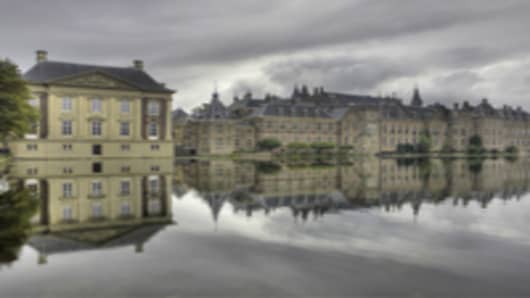The early Thursday morning victory of pro-European parties in the Dutch elections proves that despite growing euroskepticism in the Netherlands, the country still favors Europe, Adriaan Schout, deputy director of the Netherlands Institute of International Relations told CNBC on Thursday.
“The Netherlands will keep the handbrakes on, but there won’t be discussions about the country exiting the euro,” Schout said. "When put on the spot, the public is in support of the EU.”
The results, based on 96 percent of votes counted, gave Dutch Prime Minister Mark Rutte’s center-right Liberal party 41 seats, a slight victory over the center-left Labor party, which won 39 seats.
Han ten Broeke, member of parliament and foreign affairs spokesman for the Liberal Party, told CNBC: “The Dutch have a long been asking for a stable government. This is what we will provide now. Europe can rest assured that this will happen.”
In the run-up to elections, it became clear that the Netherlands was not unanimously in favor of a pro-European government. Just three weeks ago, the leader of far-left Socialist Party Emile Roemer, who campaigned against austerity and euro zone bailouts, was leading Rutte in the polls.
But Labor leader Diederik Samsom gained electoral ground when he put up a strong, charismatic performance in the election debates, harming the Socialist party's prospects.
The Socialist party came third in Wednesday's vote, while Geert Wilders’ far-right anti-immigration Freedom Party (PVV), which advocates leaving the euro and the European Union, took heavy losses.
Schout said that the outcome is “a good barometer of the wider sentiment on the EU.” He drew a comparison with Wednesday’s ruling by the German Constitutional Court, which gave the green light for ratify the euro zone's new rescue fund, but imposed conditions to the ruling including a cap on Germany's contribution to the fund. It shows that people want Europe, but “with limitations,” he said.
Rutte said in his victory speech that the result was “the best outcome for the country’s economy,” and that it would “allow the country to emerge stronger from this crisis.”
The results would however not bring about any big policy changes because “there is very little money to actually change course,” Schout said. “We will continue the same austerity-driven course and we will be reliable partners.”
Ten Broeke expressed confidence that the Netherlands will meet the 3 percent deficit target imposed by the EU for 2013. “That is the one thing that is certain.”
A potential risk for market sentiment could lie in the formation of a coalition government. Rutte did not win a majority of the vote and will need to join forces with other parties. After the last elections it took 125 days to form a coalition government, but analysts do not expect the talks to drag on this time.
“The pressure from Europe and financial markets is on,” Anke Streuss, senior economist at Rabobank, told CNBC.
While the new government will continue to support the euro zone, it is expected to harden its tone and show little leniency towards Greece.
In the run up to the elections Rutte said the country should not get any more financial aid from Europe. Ten Broeke confirmed this policy direction. “There is only one message for Greece: they have to live up to the conditions that were set to them. This is what the European Union is saying, this is what Germany is saying, this is what the Dutch are saying.”
The Dutch economy is the fifth largest in the euro zone and the Netherlands is one of just four countries in the euro zone that still have a AAA rating. Its deficit target is expected to be 4.2 percent of gross domestic product in 2012. Last week Dutch 10-year yields reached a historic low.
—Reporting by CNBC’s Carolin Schober; Follow Her on Twitter: @CarolinSchober. Writing by Liza Jansen; Follow Her on Twitter @lizajansen


